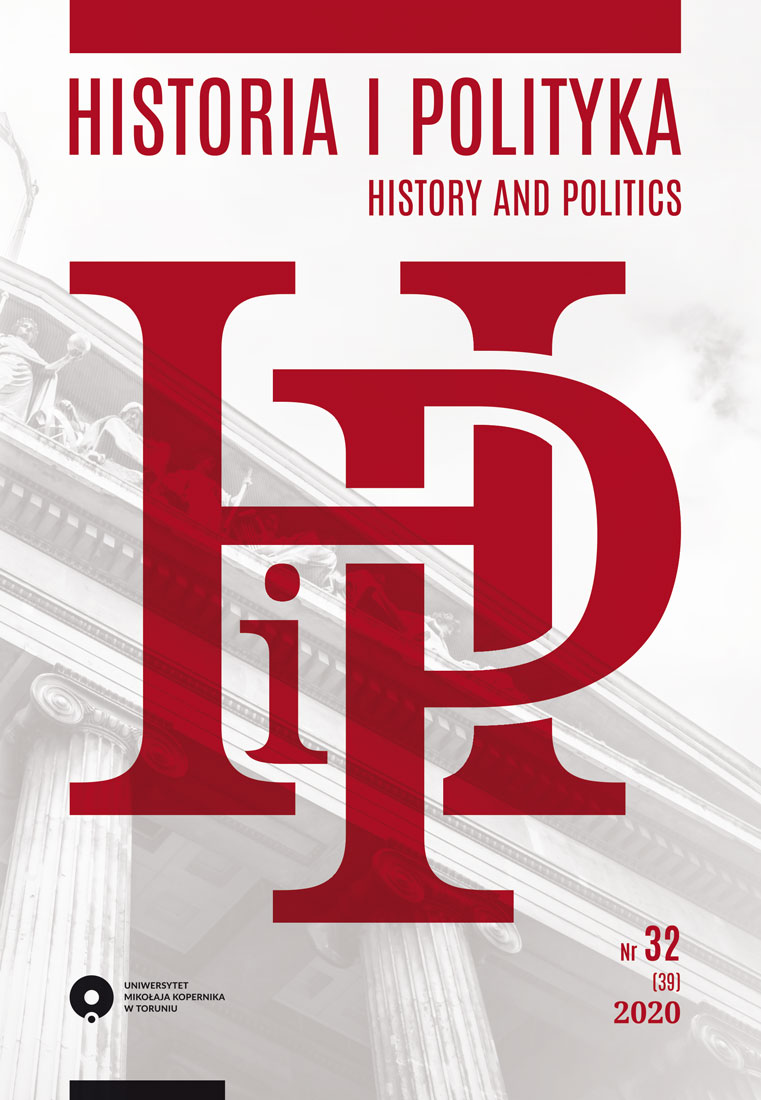Political Aspects of Reproduction of Inequalities in the Republic of South Africa
DOI:
https://doi.org/10.12775/HiP.2020.011Słowa kluczowe
Republic of South Africa, inequalitiesAbstrakt
The Republic of South Africa has been recently recognized as the world’s “most unequal state in terms of wealth and income distribution”. The Gini coefficient for wealth distribution in South Africa stands at 0.96%, which perfectly reflects the total coefficient of wealth distribution across the globe. The purpose of the article is to answer the question of how inequalities inherited from the apartheid period were even further aggravated after 1994.Bibliografia
AfrAsia Bank (2019). The 2019 South Africa Wealth Report Describes Growth at Home as Moderate. Retrieved from: https://www.afrasiabank.com/en/about/newsroom/news/2019/the-2019-south-africa-wealth-report-describes-growth-at-home-as-moderate.
Beinart, W. (2001). Twentieth Century South Africa. Oxford: Oxford University Press.
Electoral Commission of South Africa (n.d.). Retrieved from: https://www.elections.org.za.
Hanoman, J. (2018). Hunger and Poverty in South Africa: The Hidden Faces of Food Insecurity. New York: Routledge.
Hirsch, A. (2005). Season of Hope: Economic Reform Under Mandela and Mbeki. Pietermaritzburg: University of KwaZulu-Natal Press.
Interview with Andrew Donaldson (2019, February 20). Deputy Director-General in the National Treasury, Cape Town.
Interview with Ben Turok (2019, February 20). Institute for African Alternatives, Cape Town.
Interview with Jeremy Seekings (2019, February 19). University of Cape Town, Department of Sociology.
Jerven, M. (2013). Poor Numbers: How We Are Misled by African Development Statistics and What to Do About It. Ithaca and London: Cornell University Press.
Jordan, P. (2004). The African National Congress: From Illegality to the Corridors of Power. Review of African Political Economy, 31(100), 203–212. DOI: 10.1080/0305624042000262248.
Milanovic, B. (2016). Global Inequality: A New Approach for the Age of Globalization. Cambridge: Harvard University Press.
Mine, Y. (2013). Beyond Ad hoc Power-Sharing: Comparing South Africa and Zimbabwe. In: Y. Mine, F. Stewart, S. Fukuda-Parr, & T. Mkandawire (eds.). Preventing Violent Conflict in Africa: Inequalities, Perceptions and Institutions (pp. 95–125). New York: Palgrave Macmillan.
Neubert, D. (2019). Inequality, Socio-cultural Differentiation and Social Structures in Africa: Beyond Class. New York: Palgrave Macmillan.
Oxfam (2019). Public Good or Private Wealth? Retrieved from: https://oxfamilibrary.openrepository.com/bitstream/handle/10546/620599/bp-public-good-or-private-wealth-210119-en.pdf.
Piketty, T. (2015). Kapitał w XXI wieku. Warszawa: Wydawnictwo Krytyki Politycznej.
Polus, A., & Cześnik, M. (2016). Reforma rolna w Zachodniej Prowincji Przylądkowej Republiki Południowej Afryki. Politeja, 13(43), 121–138. Retrieved from: http://akademicka.pl/ebooks/free/a80897cfaa6b1c7d5a1593c0c3a0ff3e.pdf. DOI: 10.12797/Politeja.13.2016.43.05.
Shai, K.B. (2017). South African State Capture: A Symbiotic Affair between Business and State Going Bad(?). Insight on Africa, 9(1), 62–75. DOI: 10.1177/0975087816674584.
Southall, R. (2012). South Africa’s Fractured Power Elite. Seminar at Witwatersrand University, 1–17. Retrieved from: https://wiser.wits.ac.za/system/files/seminar/Southall2012_0.pdf.
Statistics South Africa (2017). Poverty Trends in South Africa: An Examination of Absolute Poverty between 2006 & 2015. Retrieved from: https://www.statssa.gov.za/?p=10341.
Statistics South Africa (n.d.). Retrieved from: http://www.statssa.gov.za/?cat=22.
Terreblanche, S. (2002). A History of Inequality in South Africa, 1652–2002. Pietermaritzburg: University of KwaZulu-Natal Press.
Terreblanche, S. (2018, January 25). The Co-optation of the African National Congress: South Africa’s Original ‘State Capture’. Pambazuka News. Retrieved from: https://www.sahistory.org.za/article/co-optation-african-national-congress-south-africas-original-state-capture-sampie.
The Economist (2016, April 2). Globalisation and Inequality. The New Wave. The Economist. Retrieved from: https://www.economist.com/books-and-arts/2016/04/02/the-new-wave.
Therborn, G. (2019). South African Inequalities in a Global Perspective. In: C. Soudien, V. Reddy, & I. Woolard (eds.). Poverty & Inequality: Diagnosis, Prognosis, Response (pp. 31–41). Braamfontein: HSRC Press.
de Villiers, J. (2018, April 5). There are Now 3,200 Dollar Millionaires Living in Paarl, Franschhoek and Stellenbosch. Business Insider SA. Retrieved from: https://www.businessinsider.co.za/paarl-franschhoek-stellenbosch-are-the-fastest-growing-south-african-areas-of-dollar-millionaires-2018-4.
Wprost (2018, July 16). Przybywa milionerów. Najwięcej jest ich w Warszawie. Wprost. Retrieved from: https://www.wprost.pl/kraj/10139757/przybywa-milionerow-najwiecej-jest-ich-w-warszawie.html.
Pobrania
Opublikowane
Jak cytować
Numer
Dział
Licencja
Uniwersytet Mikołaja Kopernika w Toruniu respektuje prawo do prywatności i ochrony danych osobowych autorów.
Dane autorów nie są wykorzystywane w celach handlowych i marketingowych. Redaktorzy i recenzenci są zobowiązani do zachowania w poufności wszelkich informacji związanych ze złożonymi do redakcji tekstami.
Autor, zgłaszając swój tekst wyraża zgodę na wszystkie warunki i zapisy umowy licencyjnej (określającej prawa autorskie) z Uniwersytetem Mikołaja Kopernika w Toruniu.
Statystyki
Liczba wyświetleń i pobrań: 455
Liczba cytowań: 0



